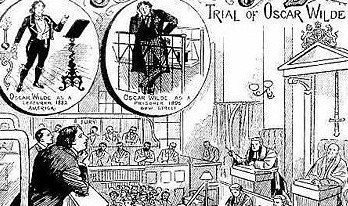
April 7, 2014, by Harry Cocks
Was Oscar Wilde Fairly Tried?
On 25 May 1895 Oscar Wilde and his co-defendant Alfred Taylor were convicted of gross indecency and sentenced to two years imprisonment with hard labour. The key evidence against them came from their former associates – “renters” Charles Parker, Fred Atkins and Alfred Wood who testified that Wilde had committed “indecent acts” with them and that they had procured young men for him. Their evidence was supported at the second trial by that of Antonio Migge, the Savoy hotel’s “professor of massage,” who claimed to have seen a young man sleeping in Wilde’s bed. Jane Cotter, a chambermaid at the hotel, also told the court about stained sheets on the writer’s bed. The direct evidence of any sexual acts committed by Wilde was relatively brief and most of Wilde’s accusers were themselves self-confessed blackmailers involved in London’s homosexual demi-monde. In general, the evidence of such “accomplices” to any acts would have required corroboration, but in Wilde’s case this was not very extensive. So was Wilde was fairly tried, especially on the question of corroboration? This requires us to understand the prevailing law of evidence. It was settled practice in criminal courts at the time that the evidence of accomplices to any crime (or anyone who admitted being involved in any such circumstance) required corroboration. The specific rules surrounding corroboration changed several times in the course of the nineteenth century, mainly because this was never a settled point of law, and it is this which raises a question about Wilde’s case. At Wilde’s two trials, the key evidence against him came from just such accomplices – Charles Parker (who was alleged to have committed sodomy with Wilde at the Savoy), Fred Atkins and Alfred Wood. Similar evidence had been put forward during the Cleveland Street scandal of 1889-90 when several aristocrats were found to have entertained telegraph boys at a brothel in Fitizrovia. In that case the evidence of the boys was not thought by the law officers to be a secure basis for criminal cases against the gentlemen involved. What had changed?
The answer might be found in the fact that the rules governing corroboration were far from agreed upon in the nineteenth century and allowed massive discretion to judges. By the 1880s corroboration was generally deemed to lie not in any fact that might directly implicate the accused in the crime (which had been the rule between 1834 and 1883, and was again after 1916), but in the broad sense of having accomplice evidence confirmed in any respect. Although Wilde’s jury at the first trial were warned several times by Mr Justice Charles about the status of such corroboration, the generous interpretation of the rule argued for by counsel for the prosecution, the Solicitor-General Sir Frank Lockwood, was allowed. This meant that seemingly inconclusive facts such as Wilde’s acquaintance with Taylor, the stained sheets of the Savoy and the ambiguous testimony of the hotel’s employees about Wilde’s bedmates could stand as effective verification of his sexual relations with Parker, Wood and persons unknown. Lockwood also successfully argued that the rule requiring corroboration of accomplice evidence was not a rule of law, but merely one of practice, and therefore could be safely overlooked by the judge. The cumulative weight of the prosecution’s case in both trials, including the evidence from the libel case during which Wilde had made incautious comments about the beauty of youth, amounted not to direct evidence of any sexual acts, but rather a tour de force of insinuation. However, this evidence was ultimately held by Mr Justice Charles to be sufficient compensation for the dubious character of Wilde’s accusers. So Wilde fell foul of a particular interpretation of the law of evidence, one that was altered again a few years later. In this case judicial discretion was sanctioned by the prevailing practice and Wilde’s status as a queer martyr was secured.
Harry Cocks, “Wilde and the Law”, in Kerry Powell and Peter Raby, (eds.), Oscar Wilde in Context (Cambridge, 2013)
No comments yet, fill out a comment to be the first

Leave a Reply